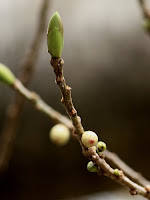 by Ragan Sutterfield
by Ragan Sutterfield
I have been shopping for trees lately—apples, figs, maybe a few persimmons. It will be couple of years before the trees bare fruit and now, as we move into December the trees are dormant, reserving their sugars to live out a time when the sun won’t be around enough to power their life. The trees are moving to their reserve supplies; they are waiting until the spring. But at some point, when the conditions of rain and sun and a myriad of other factors come together, there will be a moment, one moment, when the trees will shoot forth leaves again. This will happen simultaneously for trees of the same species, in the same area, at similar elevations.
The same will begin to happen with other plants. Seeds planted in the cold ground of February will begin sprouting in March and as a farmer, if I’m not ready for the work of weeding and tending and watering, I’ll be in trouble in a hurry. The garden will suddenly spring to life and I better be prepared to meet its bounty and challenges. Though winter is a slower time, beware the farmer that slacks off for three months when she’s not actively growing food.
In the agrarian world of Jesus’s peasant audience in Luke 21:25-36 this picture of watching for the signs of a new season and being ready to respond would have made a great deal of sense. Jesus uses this idea of watching for the “signs of the times” to point to a new sort of spring—the coming of his kingdom of righteousness. It is a time that will bring woe to those who have not prepared to meet the coming spring, but a time of coming abundance for those who have.
This same reality is echoed in Jeremiah 33:14-16. “The days are surely coming, says the Lord, when I will fulfill the promise I made…In those days and at that time I will cause a righteous Branch to spring up for David.” Justice and righteousness will soon spring forth. The messiah is coming.
So how do we spend this time of winter? How will we ready our selves so that the day of Christ’s coming will not “catch [us] unexpectedly”? The answer comes in the Epistle to the Thessalonians: “may the Lord make you increase and abound in love for one another and for all.” We prepare for the coming of Christ through building up of agape communities, communities that grow from the Church but spread that love to all.
To return to our agricultural metaphor we might think of the Church as soil and of agape as a soil amendment like fertilizer or lime. If you take a pasture of grass in a place that has soil that is slightly acidic (a pH of 5 say) and add enough lime to raise the pH closer to neutral (pH of 6.5) then amazing things begin to happen to that pasture. New plants will begin to appear as dormant seeds are brought to life through the new condition of the soil, legumes that are rich in protein to feed cattle and sheep will begin to grow and build the soil by fixing nitrogen, grasses that offer animals no nutrient value will begin to decline and the field will begin to flourish in an idyllic deep green.
When we increase agape in our communities this same flourishing will take place. The soil will be ready to grow the seeds of justice and righteousness that will bring Christ’s presence into our particular communities and places. So let us grow in agape love, spreading it in our hearts and communities, that we might use this time of winter to prepare for the welcoming of God’s kingdom that is already present and springing forth.
home
November 25, 2009
Spring Will Come Before We Know It
Subscribe to:
Post Comments (Atom)

No comments:
Post a Comment